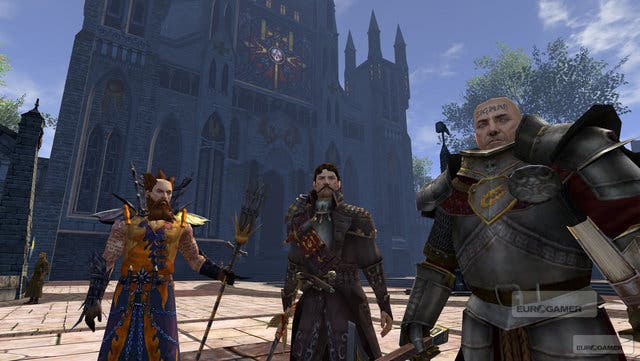Gold Trading Exposed: The Players
Playing away.
"Buying gold is relatively simple, actually," he says. "You go to any of the millions of gold-selling sites, tell them your character name and server and your phone number. You pay by PayPal. They call you to check you are who you say you are, then usually within 48 hours you'll have your gold, depending on the amount you want."
Martin says he never replies to spammers and always sticks with the same RMT company; he is, in effect, the classic loyal and regular customer of both Blizzard Entertainment and this unnamed third party.
For him, the equation is simple. "There's a philosophy at Blizzard that it doesn't matter who you are in 'Real Life' - all are equal in WOW. Except they're not, as I have a job and a girlfriend and some money and no time, whereas some people have no job, no girlfriend, no money but a lot of time. I see the gold selling market as fulfilling Blizzard's philosophy in a way that the game itself can never do."
Whilst he knows that some gold sellers got their money by hacking and robbing characters and entire guilds (ironically, he said this had just happened to his own guild via another player "who doesn't buy gold and I do"), his view is not going to change.
"Gold is relatively expensive. A significant item will cost between 2000 and 15,000 gold, with an average of around 4 to 5000. Gold costs around GBP 10 per thousand, so it's not something many people are likely to do very much.
"By comparison, making 1000 gold in-game would take around 6 to 10 hours game time and would be most efficiently done over a few days. I earn quite a bit more than one pound an hour and I have little spare time outside of raids and girlfriend and work, so it makes more sense for me to buy gold than it does to grind it out. So I do, and often."
Extreme views

Over again to 'Extreme Gamer', who runs the WoW Gold Facts review site. During our conversations he revealed that he, too, had been scammed by a Chinese gold-selling site ("the common denominator of these losers is that they're based in China"), and that led to his desire to review and recommend the 'best' sellers in the industry.
"For the record, I believe that RMT is actually good for online games. It's great to be able to get real-world value out of all of the effort and time I put into online games. It's great knowing that my virtual stuff has actual, real value. It increases my emotional commitment to my character and that is good for the publisher because it makes me more likely to keep paying them every month to maintain my account.
"I've been told by contacts in the industry that most virtual items purchased using RMT are items with which other players cannot interact ... like trade-skill resources, mounts and housing," he says.
He thinks there might be a correlation between online games that succeed, and strong links to RMT.
"Look at the lack of success of games that went out of their way to 'design RMT out', like Guild Wars and Warhammer Online. They are less fun to play and they never achieved the kind of subscriber-base seen by games with big RMT connections like EverQuest, WOW, and others. I suspect that the real reason game publishers forbid RMT and claim total ownership of everything has to do with their concerns about potential liability.
"Imagine if a court someday decides that subscribers have certain rights in the content they help to create in online environments, whether it's World of Warcraft or MySpace. Imagine if a court one day gives virtual items some of the legal characteristics of real-world property. There is no way the publishers want to open that can of worms, where they may be held responsible for losses that could occur.
"Which is one way of saying: it's really about the money, more than anything else."
Nick Ryan is a journalist and producer, author of Homeland: Into a World of Hate (Mainstream).